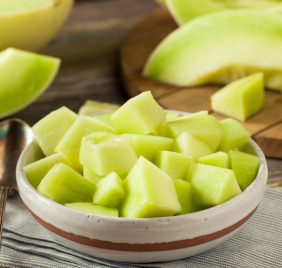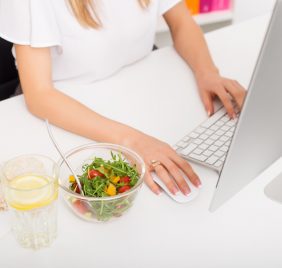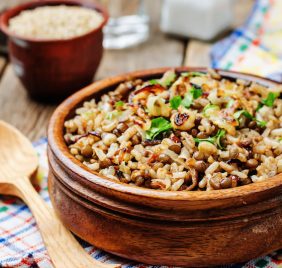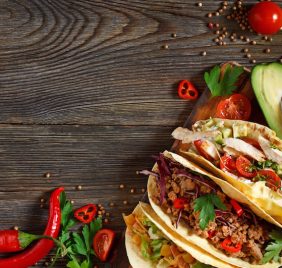Guest Post by EatingWell Magazine
Find out if eating at your desk is dooming your diet and get tips for keeping calories in check.
Be honest: if you work in an office, how often do you eat your lunch or reach for a snack at your desk? And if you do, how often do you spend your lunch or snack breaks multitasking—reading tweets, catching up on emails or flipping through a magazine? As most weight-loss experts will remind you, multitasking at mealtime is not ideal: it’s better to eat mindfully, savoring every bite. But if that’s not likely to happen, you can still take small steps to stay aware of your workday calories. Here are a few ways to help you keep calories in check when eating “al desko.”
Plan, plan, plan.
Decide how many calories you should be eating in a day. Then, plot out what you’ll eat for your meals and your snacks. Choose things that you like, that taste good. That are memorable. Stick to the menu and you’ll be less likely to overeat.
Stop before you snack.
Are you really hungry? Or are you anxious? Often, people start munching when they’re stressed or bored. If that’s the case, popping a piece of gum or getting yourself a cup of tea could help distract you from emotional eating. Or consider taking the time to stretch or take a short walk to get some water. An exercise break is even better, and many people find they’d rather take a time-out to walk than to eat. If that’s true for you, take a walk during lunchtime, then return to your desk with improved focus to eat lunch while reading through a report or cleaning out your work inbox. If you’re going to multitask while eating, you might as well prioritize exercise first, then get back on the clock and back to business, rather than wasting time on social media.
Nosh on low-cal, crunchy foods.
When you’re eating at the computer, it’s easy to throw back several ounces of nuts, pretzels or potato chips, which means consuming several hundred extra calories. So try reaching for snap peas and carrots instead. You’ll save on calories, while still getting the satisfaction of eating a crunchy food.
Keep a food diary.
Countless studies show that writing down everything you eat (or drink) boosts weight-loss success. Tracking forces you to take a look at what you’re really eating. Be sure to record what you’re eating just after you’ve eaten it so you don’t forget anything. Knowing that your meal will be out there in pen and ink might be enough to encourage you to make healthier choices and keep your portion sizes in check.
©Meredith Corporation. All rights reserved. Used with permission.












